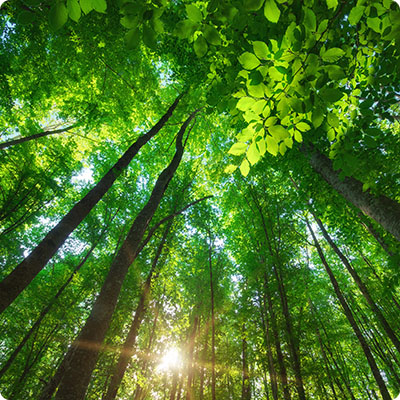National parks
Germany has a total of 14 national parks. Two of them are in Bavaria. The Bavarian Forest National Park (Nationalpark Bayerischer Wald) is close to the border with the Czech Republic. Further south is the Berchtesgaden National Park. The highest altitude here is around 2,713 m, and it's the ideal place to discover Bavaria's wild flora and fauna. In addition to these large national parks, there are 18 nature parks, including the Altmühltal, some 80 km south of Nuremberg, and the Frankenwald and Fichtelgebirge to the north and east of Bayreuth. In addition, there are over 600 protected areas (Naturschutzgebiet). All in all, almost 23,000 km² entirely dedicated to nature and plant and animal species. That's about a third the size of Bavaria!
Fauna
Bavaria is home to a large number of animal species. It's not uncommon to come across hare, fox, doe or wild boar on a walk in Bavaria, and if you look up, you'll see that there are many varieties of bird, including eagles. However, many of these animals, such as hares and lynxes, are on the endangered species list. The state therefore attaches great importance to their re-establishment and preservation. Since their reintroduction to the Bavarian Forest, there are now around ten lynx in the wild. The beaver, which had totally disappeared, was reintroduced in the 1960s and is now successfully surviving and reclaiming its territory.
A unique specimen in Bavaria is the Sadleriana bavarica (called Bayrische Zwergdeckelschnecke in German), a small freshwater snail measuring around 2 millimeters, which has survived from the Ice Age to the present day. So far, it has only been found in a stream in Munich. The exact locations are kept secret to protect the species from visitors. Unlike most gastropods, which are hermaphroditic, sadlerina bavariana is sexually mature, and males and females can be distinguished by their shells.
Flore
Bavaria's forests are essentially vast spruce forests. Spruce(Fichte in German) accounts for 44% of trees in Bavaria. It is followed by pine(Kiefer) with 19% and beech(Buche) with 12%. The oak, Germany's emblematic tree whose leaf adorns the 1, 2 and 5 cent coins, accounts for no more than 6% of Bavarian trees. In the valleys and at the foot of the Alps, there is fertile agricultural land.
As soon as spring returns, nature reclaims its rights and many varieties of flowers appear. Bavaria is home to a large number of wild species (orchids, gentian, Alpine roses), the best known of which is the edelweiss, the cottony white flower of the mountain massifs. Another emblematic mountain flower is galanthus nivalis, also known as snowdrop because of its ability to bloom before the snow melts, as early as January or February. It is a toxic plant with vomiting properties.
There are a few species that are absolutely unique to Bavaria. Cochlearia bavarica(Bayrisches Löffelkraut in German), a small white flower inherited from the Ice Age but discovered only in 1984, is found nowhere else. It needs a source of pure, calcareous water, and its rarity makes it an endangered species. It is now only found in Swabia and Upper Bavaria.

















